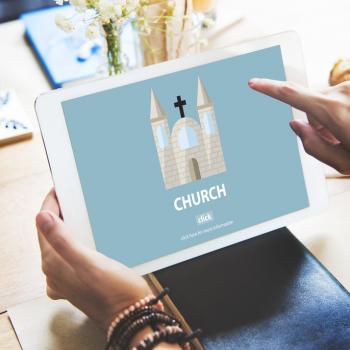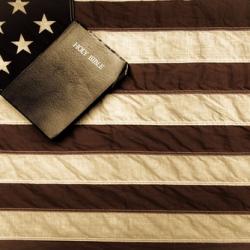
I write a lot about my beliefs, to the point where I sometimes cringe at how assured and confident I seem when I look in old posts. But the truth is that the writer of these words doesn’t always feel as solid as he sounds, and mountain-moving faith is quickly replaced by that which aspires to being mustard seed-sized. I’ve called myself an “Occasional Atheist” for how quickly my faith can turn to doubt and unbelief.
Doubt has been a part of my Christian walk since I crept to my parents’ room one night at 7 years old to tell them I was afraid I hadn’t prayed enough when I got saved. In some form or another, it’s been persistent, sometimes just a faint whisper and other times a raging storm. I don’t talk much about it because, honestly, the church doesn’t talk much about it. Some believers think that to doubt is to sin, that true Christians may have a moment of wavering but prolonged doubt and questions are antithetical to the faith.
But I do doubt, and I know that I’m not the only one. What I’ve learned through my struggles is that it’s something we all need to address and be open with. Here’s what I wish people had told me about doubt growing up.
- It’s okay. It’s tempting to deny the questions that arise to the point where we won’t acknowledge asking them, but it’s understandable. Our biblical heroes are people who have shown unwavering faith. We champion Abraham for leaving his home when God called him and David for grabbing his slingshot when Goliath challenged. Thomas, on the other hand, is a cautionary tale. But read the Thomas account again; Jesus doesn’t rebuke his disciple’s doubt; he meets him it. We forget that Abraham had questions not only about God’s ability to provide him a son but to keep him and his wife safe in strange lands. David often had strong faith, but he also wrote Psalms chronicling dark nights of the soul. Even Jesus in the garden acknowledged questions about God’s plans. Doubt happens even to spiritual giants and questions slip through our best theological arguments. It happens to all of us. It’s not a sin. It’s okay. And it’s better to acknowledge it and walk through it than think you’re stronger than it.
- It’s sneaky. Doubt is like a spiritual version of depression or anxiety. It comes without warning; it’s not always brought on by difficult life experiences. You can be listening to a sermon, perfectly content on Sunday morning, and then think “Do I really believe in all this?” You can be playing with your kids at the park and the thought will creep in, “Is this all there is?” Yes, struggles and trials can often prompt spiritual wrestling. But in my experience, doubt doesn’t so much bust down the door; it sneaks in through the window on sunny days and whispers its questions in my ear. There isn’t a way to predict it and, really, there isn’t a way to avoid it. It comes in like a slight shift in the wind, and sometimes you’re the only one who feels the climate change.
- It can’t always be explained away. When I went through my first serious battle with doubt, I fought back with apologetics. Evidence That Demands a Verdict, The Case for Christ, Mere Christianity. And I don’t want to devalue some of the good apologetic material out there. Part of what often draws me back to my faith is that I believe it’s rational. Scripture never urges us to shut off our brain but rather to engage it. But sometimes the arguments won’t work. In fact, sometimes our attempt to find an intellectual solution just makes it worse. I read apologetics books voraciously until I began asking “Why do only people who believe this tend to write these books”? You’ll always find one nagging question to your doctrinal solutions (and if you’re Calvinist, you’ll begin to wonder if you’re just not chosen, which is a whole bag of worms you don’t want to open). The truth is, no theological argument is airtight and there’s never going to be something that can’t be questioned. We wouldn’t need faith if there was. We are finite beings trying to understand the infinite, and we’ll never have it completely locked down. And sometimes, doubt is more like a feeling than a question. You might have evidence in front of you, but something is just not swaying you in the moment. Faith doesn’t mean this won’t happen; faith means believing it’s temporary.
- It’s sticky. I feel like Christian culture sometimes gives everyone a one-time doubting pass. We figure there will come a point where we have some questions or niggling feelings about our beliefs. This is our Crisis of Faith ™ that God helps us overcome and then the rest of our life is spiritually coasting. I wonder if that’s why in our initial battle with doubt we often load up on apologetics and arguments; we think this is our big fight and we’re ready to get it over with. But it’s been 20 years since my college days, and I still fight doubt. I still have evenings where I lie in bed wondering if I’ve chosen the right faith or if there’s anything to have faith in. I alternate between being a confident, Bible-believing Christian and a doubtful, questioning unbeliever. As I write this, I’m in a period of questioning. Tomorrow morning, I could likely be back in a place of strong belief. I’ve learned to look at my spiritual life not as a story with one big climax but as a river where sometimes the water is placid and other times there are rocks, rapids and undertows. I doubt it will stop throughout my life. It’s pushing through that’s important.
- It’s essential. It’s easy to look at these points and feel overwhelmed, like we’ll never avoid a life of doubt — and we won’t. But that’s not because doubt wins; it’s because we grow not in spite of our doubts but because of them. I’ve heard it said that doubt is the soil in which faith grows. It’s through wrestling with questions and disbelief that we rip down our own pride and intellectual idols, and come to the end of ourselves and a greater understanding of God. Job didn’t believe he had truly known God until after chapters of questioning. The Psalmists go through doubts and questions before they come to a place of greater belief. Without doubt, we grow stagnant and our faith grows overly intellectual, our understanding of God limited only to what we can explain. Doubt helps us see the limitations of the crutches we’ve used to understand God and asks us to walk forward in confidence. It’s difficult, terrifying and sometimes lonely, but it brings us to a better place.












